Percy Jackson’s Greek Gods offers a fresh, humorous retelling of ancient myths through Percy Jackson’s perspective. Rick Riordan masterfully blends mythology with modern wit, making the gods relatable and entertaining for readers of all ages.
1.1 Overview of the Book
Percy Jackson’s Greek Gods is a captivating retelling of ancient Greek mythology, narrated by Percy Jackson. The book humorously recounts the creation of the world, the antics of major gods, and their intricate stories. With Percy’s sarcastic commentary, the gods are portrayed as relatable, flawed characters. Rick Riordan’s approach blends humor with timeless myths, making the book accessible and engaging. It explores themes of power, fate, and morality, offering a fresh perspective on classical tales.
1.2 Rick Riordan’s Approach to Mythology
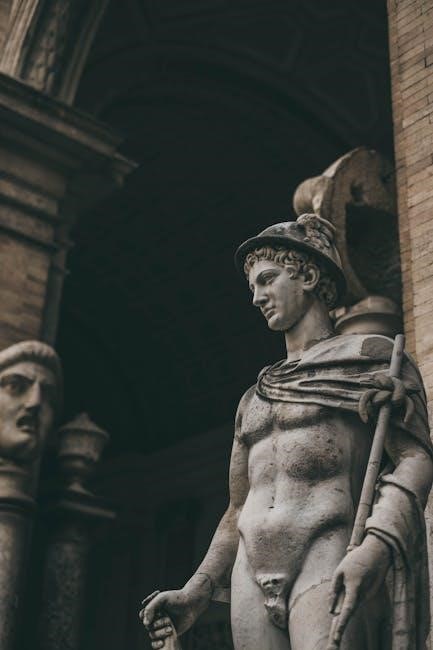
Rick Riordan’s approach to mythology in Percy Jackson’s Greek Gods is modern and humorous, making ancient tales relatable. He infuses myths with Percy’s witty commentary, adding a personal touch. Riordan stays true to the original stories while injecting humor and contemporary references, making the gods and their antics accessible to a younger audience. His engaging style balances entertainment with educational value, highlighting themes like power, fate, and morality in an entertaining yet insightful way.
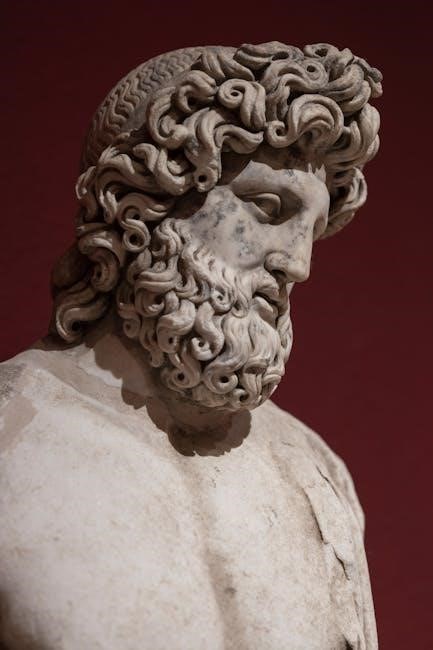
1.3 Percy Jackson as the Narrator
Percy Jackson’s narration in Greek Gods adds a unique, relatable voice. His sarcastic remarks and personal insights make ancient myths feel fresh and engaging. Percy’s perspective as a demigod offers a bridge between the mortal and divine worlds, highlighting the complexities of godly behavior. His humor and honesty create a compelling story that captivates readers, making the gods and their stories memorable and accessible to a modern audience while maintaining the essence of the myths.
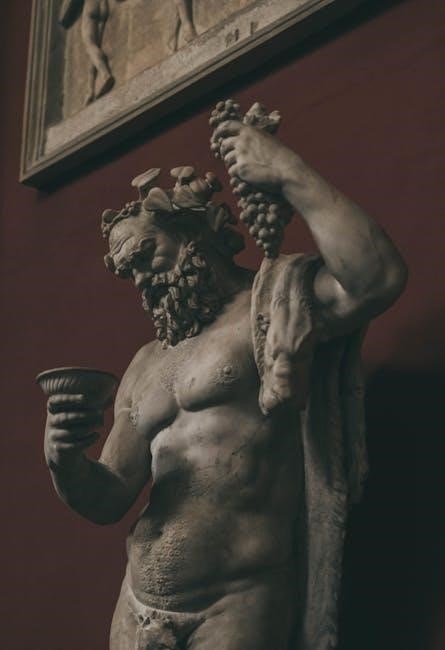
The Structure of the Book
Percy Jackson’s Greek Gods is structured chronologically, starting with the creation of the world, followed by stories of major gods, and ending with mortal interactions, all narrated with Percy’s signature humor and wit, making the ancient myths engaging and accessible to modern readers.
2.1 The Creation of the World
Percy Jackson’s Greek Gods begins with a humorous retelling of the world’s creation, blending ancient myths with modern wit. Percy explains how Gaea, the Earth, emerged from chaos, followed by the primordial gods like Uranus and Pontus. He vividly describes the violent struggles between these deities, setting the stage for the Olympian gods’ rise. Percy’s narrative makes the creation story engaging and relatable, infusing it with his signature sarcasm and humor to captivate readers. This fresh perspective breathes life into the ancient tales, making them accessible and entertaining. The chapter establishes the foundation for understanding the divine world and its complexities.
2.2 Major Gods and Their Stories
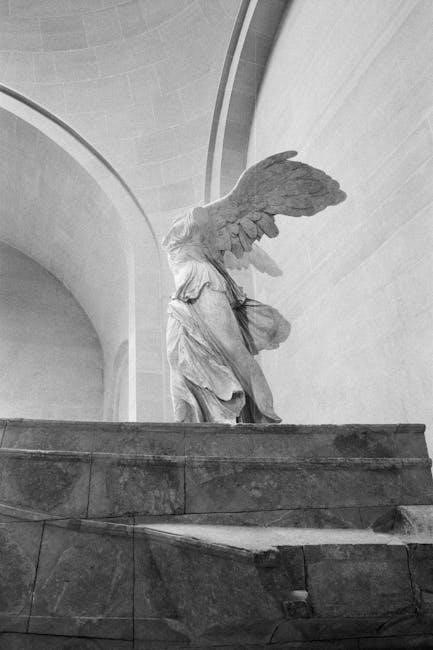
Percy Jackson’s Greek Gods delves into the stories of major deities with humor and sarcasm. Zeus, Poseidon, and Hades are portrayed with their iconic traits, while Hera, Athena, and Dionysus showcase their unique roles. Percy’s retelling humanizes the gods, highlighting their flaws and quirks. His witty commentary adds modern flair to ancient tales, making the gods relatable and memorable. Each story is woven with humor and insight, capturing the essence of Greek mythology through Percy’s unique lens.
2.3 The Role of Mortals and Demigods
Mortals and demigods play a crucial role in Percy Jackson’s Greek Gods, often serving as catalysts for divine events. Percy’s narrative highlights how their bravery and decisions influence the gods’ actions. The stories emphasize the interconnectedness of mortal and divine worlds, showing how demigods like Percy bridge these realms. This dynamic underscores the book’s theme of power and responsibility, making the tales resonate with readers through relatable human experiences intertwined with mythology.
Themes and Lessons in Percy Jackson’s Greek Gods
Percy Jackson’s Greek Gods explores themes of power, hubris, fate, and morality. Percy’s witty narration modernizes ancient myths, offering timeless lessons on responsibility, courage, and the consequences of divine actions.
3.1 Power and Hubris
In Percy Jackson’s Greek Gods, power and hubris are central themes. The gods’ immense power often leads to arrogance, as seen in Zeus’s dominance and Poseidon’s rivalry. Percy’s narration highlights how their hubris sparks chaos, teaching readers about the dangers of unchecked power and the importance of humility. Riordan uses these myths to show how even divine beings face consequences for their pride, offering timeless lessons on responsibility and balance.
3.2 Fate and Destiny
Fate and destiny play pivotal roles in Percy Jackson’s Greek Gods, as the characters are often bound by their predetermined paths. Percy’s narration explores how even the gods cannot escape their fates, emphasizing the inevitability of certain outcomes. Through stories like Prometheus’s defiance and Hercules’ trials, Riordan illustrates the struggle between free will and destiny, showing how characters navigate their predetermined roles while striving to shape their own futures and identities.
3.3 Morality and Consequences
Morality and consequences are central themes in Percy Jackson’s Greek Gods, as Percy’s witty commentary highlights the ethical dilemmas faced by gods and mortals alike. The book examines how actions, even those of deities, lead to repercussions, teaching readers about responsibility and the importance of ethical choices. Riordan uses mythological examples to show that no one, not even the gods, is above the law of cause and effect, making the stories both entertaining and instructive.
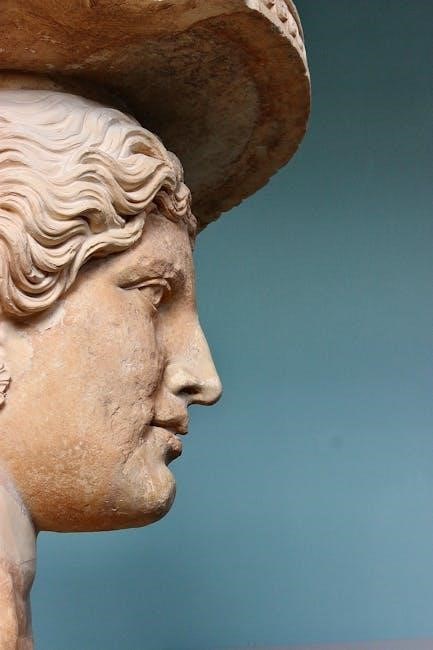
Key Characters and Their Significance
Zeus, Poseidon, and Hades are central, ruling the universe, while Hera, Demeter, and Athena embody power, nurturing, and wisdom. Dionysus and Ares add complexity, showcasing flawed yet vital roles in the divine hierarchy. Percy Jackson’s perspective highlights their human-like flaws and grandeur, making them relatable and fascinating.

4.1 Zeus, Poseidon, and Hades
Zeus, king of the gods, wields immense power, yet his decisions often spark conflict. Poseidon, Percy’s father, embodies strength and wisdom, balancing his duties as a god and a parent. Hades, ruler of the underworld, is misunderstood, showcasing a complex mix of responsibility and isolation. Together, they represent the Olympian hierarchy’s might and vulnerability, with Percy’s perspective highlighting their human-like flaws and divine grandeur in a humorous yet respectful tone, making their stories unforgettable.
4.2 Hera, Demeter, and Athena
Hera, Zeus’s wife, is depicted as powerful yet often misunderstood, her actions driven by jealousy and a desire for respect. Demeter, the nurturing goddess of agriculture, shows maternal devotion through her story with Persephone. Athena, the wise and strategic goddess of war, exemplifies intelligence and leadership. Percy’s narratives highlight their distinct roles, showcasing their strengths and vulnerabilities, while adding a touch of humor to their divine personalities, making them relatable to modern readers.
4.3 Dionysus, Ares, and Other Gods
Dionysus, the god of wine and festivities, is portrayed as chaotic yet intriguing, often bringing unexpected twists. Ares, the brutal god of war, is shown as ruthless and disliked even by other gods. Percy’s witty commentary highlights their flaws and quirks, making them relatable. Other gods like Hephaestus and Hermes add depth to the narrative, showcasing their unique roles and personalities, all filtered through Percy’s humorous and modern perspective.
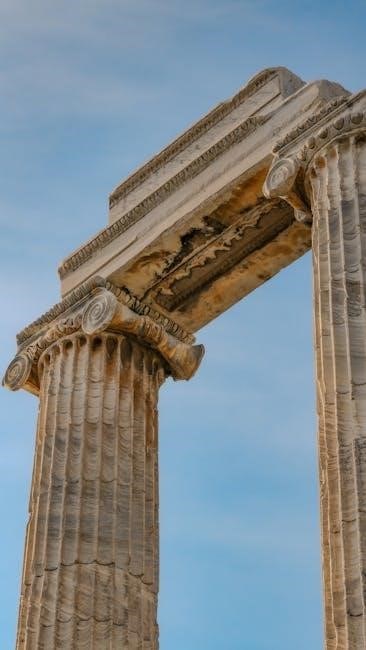
Percy Jackson’s Perspective and Humor
Percy’s witty narration and sarcastic asides bring Greek mythology to life. His modern twist and humorous commentary make the gods relatable, blending ancient tales with contemporary charm for readers.
5.1 Sarcastic Commentary
Percy Jackson’s Greek Gods is filled with Percy’s signature sarcasm and witty remarks. His humorous take on the gods’ eccentricities and absurd behaviors demystifies them, making them relatable. Percy frequently mocks the gods’ flaws, like Zeus’s quick temper or Ares’s love for violence, with clever quips that highlight their human-like shortcomings. This irreverent commentary not only entertains but also modernizes ancient myths, making them accessible and engaging for contemporary readers.
5.2 Modern Retelling of Ancient Myths
Rick Riordan breathes new life into ancient Greek myths by weaving them through Percy Jackson’s modern lens. The book reimagines classic tales with a contemporary twist, blending humor, relatability, and pop culture references. Percy’s narration transforms gods and monsters into familiar figures, making the myths feel fresh and relevant to today’s readers. This approach not only educates but also entertains, proving that ancient stories can thrive in a modern context.
Educational Value and Relevance
Percy Jackson’s Greek Gods transforms complex myths into engaging, accessible stories, enhancing learning and sparking interest in classical mythology for students and readers alike.
6.1 Making Mythology Accessible
Rick Riordan’s Percy Jackson’s Greek Gods simplifies complex myths through Percy’s witty, modern narration. By blending humor with relatable examples, the book demystifies ancient tales, making them engaging for younger audiences. The conversational tone and sarcastic asides create a bridge between classical mythology and contemporary readers, ensuring accessibility without losing the depth of the original stories. This approach sparks curiosity and encourages deeper exploration of mythological themes in an enjoyable way.
6.2 Historical and Cultural Context
Percy Jackson’s Greek Gods provides rich historical and cultural insights into ancient Greek mythology. Rick Riordan weaves in details about the gods’ roles, their interactions with mortals, and the societal norms of the time. The book highlights the significance of myths in shaping Greek culture, offering readers a deeper understanding of the historical context that influenced these stories. This blend of education and entertainment makes mythology more engaging and relevant for modern readers.
The Impact of the Book
Percy Jackson’s Greek Gods has inspired millions, blending humor with mythology. Its popularity and educational value have sparked interest in Greek culture, making it a beloved read.
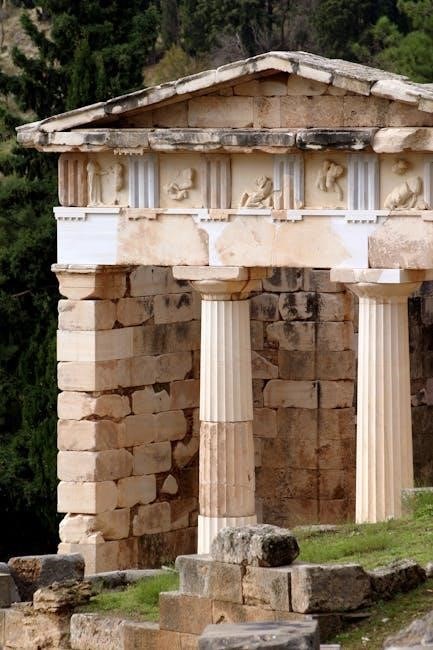
7.1 Popularity and Reception
Percy Jackson’s Greek Gods has achieved remarkable success, captivating readers worldwide with its engaging narrative. The book debuted as a bestseller, praised for its unique blend of humor and mythology. Fans appreciate Percy’s sarcastic commentary, while educators commend its ability to make ancient myths accessible. The series’ popularity has led to widespread acclaim, solidifying its place as a modern classic in children’s literature and beyond.
7.2 Influence on Young Readers
Percy Jackson’s Greek Gods has profoundly impacted young readers, making ancient mythology engaging and relatable. The book’s humor and modern perspective spark curiosity, encouraging kids to explore classical stories. Its accessible language and Percy’s relatable voice foster a deeper connection to history and literature, inspiring a love for learning and imagination in young minds worldwide.
7.3 Comparison to Other Works by Rick Riordan
Percy Jackson’s Greek Gods stands out among Riordan’s works with its unique blend of humor and mythological storytelling. While his Percy Jackson and Kane Chronicles focus on adventures, this book delves into retelling myths with Percy’s witty commentary. It shares the same immersive world-building but offers a distinct, educational angle, appealing to fans of his other series and new readers alike, solidifying Riordan’s mastery of mythological storytelling.

Leave a Reply